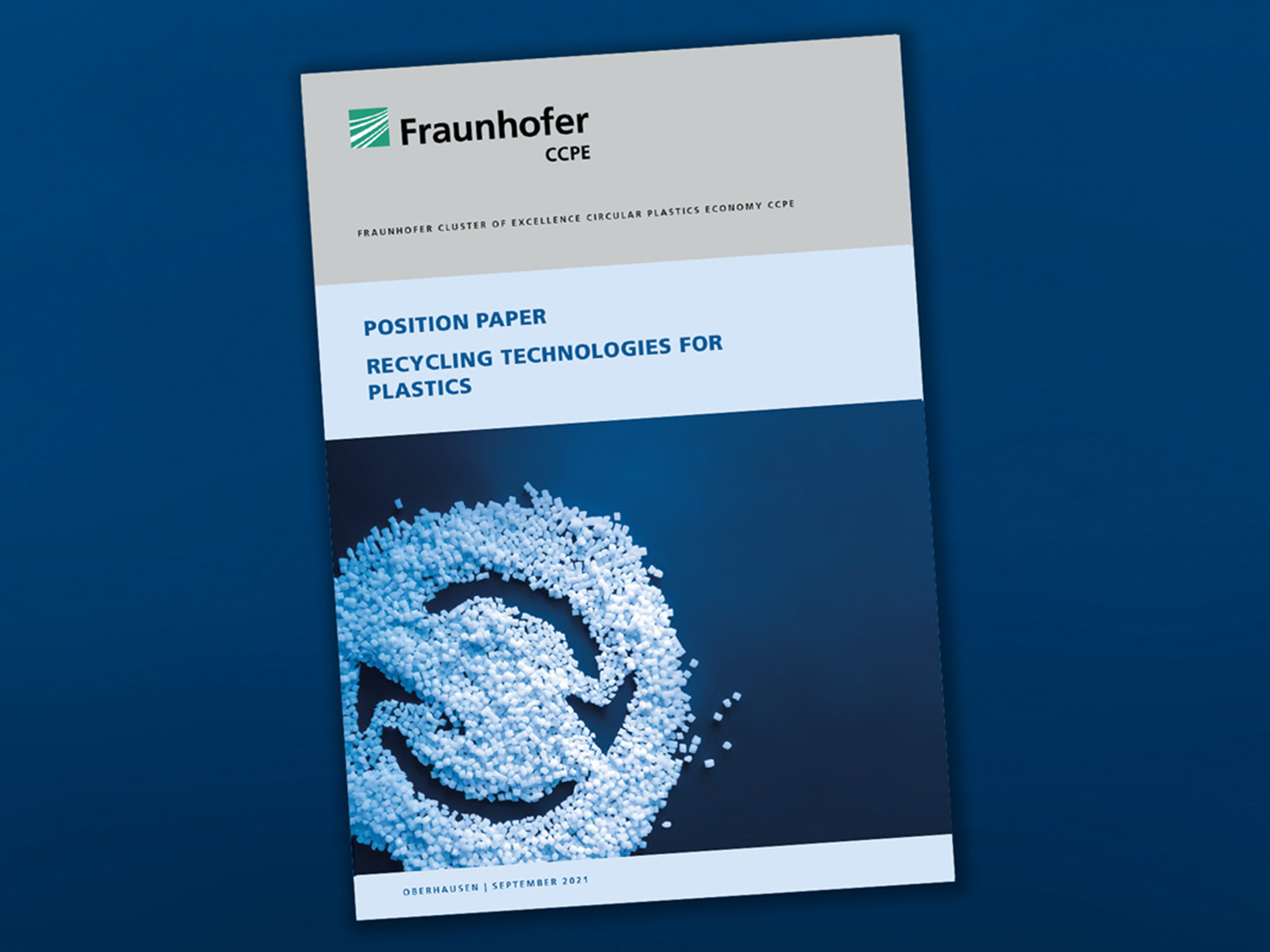Study
Fraunhofer CCPE publishes position paper and research program on plastics recycling
The Fraunhofer Cluster of Excellence Circular Plastics Economy CCPE has presented a position paper on the state of the art in science and technology of recycling technologies for plastics. The focus is on chemical recycling processes. A market analysis shows current industry activities. In addition, the Fraunhofer competence landscape in plastics recycling is presented in an overview.
The Fraunhofer position paper provides an overview of mechanical and feedstock (chemical) processing technologies for plastics that are currently under development and are not yet state of the art. In particular, so-called chemical recycling processes are classified.
The technical development status of the processes, their advantages and disadvantages, the regulatory and legal framework conditions, the economic feasibility as well as their potential for environmental and climate protection are examined. A market overview also shows which industry projects are currently underway in the field of chemical recycling, which waste materials are being treated and what plant capacity is available or planned.
Prof. Matthias Franke, Head of the Sulzbach-Rosenberg branch of Fraunhofer UMSICHT, primarily develops pyrolysis-based recycling technologies. He summarises the results: »The demand for high-quality plastic recyclates is currently increasing. This is partly due to the voluntary self-commitment of the manufacturers, and partly due to the requirements of the European Union for the use of recycled materials. With recyclate use quotas and rising CO2 prices, the competitiveness of recyclates compared to primary products is strengthened and the dependence on the crude oil price is removed. This creates investment security for recycling. We believe that new recycling technologies are technically capable of meeting the additional demand for high-quality recyclates. There is still a need for development, especially for complex wastes such as composite materials. An overall ecological assessment of the processes is also still pending.«
Based on the current state of development, the Fraunhofer researchers assess the potential of alternative recycling technologies as overall positive, if they are used as a supplement to established mechanical processes. They are technically feasible and controllable, they could contribute to improving the recycling of plastics and to providing high-quality secondary raw materials for industry. Above all, the chemical recycling processes could be a supplementary building block for higher-quality plastics recycling, especially for waste streams that have been difficult to treat up to now.
The positions of the Fraunhofer CCPE in detail:
- Mechanical processes are the best choice for single-variety plastic fractions (thermoplastics).
- With increasing heterogeneity, pollution or contamination of plastic waste, mechanical recycling reaches its limits. Fillers, contaminants and pollutants often cannot be completely removed in sorting, washing and extrusion plants. Certain types of plastic can hardly be recycled.
- In order to achieve an increase in the recycling of plastics, it is necessary to supplement the mechanical processes with alternative processes and process combinations.
- Since chemical recycling is also capable of providing secondary raw materials for plastics production, the mechanical recycling quota in the area of packaging in germany should be replaced by a recycling quota that is open to technology. This would promote technical innovations in the volume-dominant recycling of packaging.
- An overall ecological evaluation of advanced recycling processes or process combinations for specific used plastics still has to be provided.
- A partial substitution of petroleum-based basic chemicals by chemical recyclates, e.g. based on plastic waste, appears technologically possible.
Regarding the current state of industrial application, Dr. Alexander Hofmann, Head of the Research Department Advanced Recycling at Fraunhofer CCPE, adds: »Industry is showing more and more interest in advanced recycling processes. Our market analysis proves this. However, there are only a few large commercial projects so far. Therefore, there is a lack of empirical data on the long-term operation of plants, reliable data on mass and energy balances and on economic efficiency.«
In addition, industry projects for chemical recycling have so far been designed for relatively pure waste materials. Mixed plastic waste or composite materials have so far been considered less often as feedstock, even though there is considerable raw material potential here as well. There is still need for technical development before high-quality recyclates can be produced from these material flows on an industrial scale.
In the position paper, Fraunhofer CCPE presents a research agenda:
1. Improve analysis of waste containing plastics
For plastic waste, it is necessary to collect more data on its composition. Faster, more accurate and automated sensor technology and analytics should be advanced, as should the digitalisation of the waste management sector.
2. Establish transparency on economic and ecological impacts through long-term operation
A robust evaluation of advanced recycling processes requires the long-term operation of plants. The construction and operation of demonstrators should be promoted.
3. Develop dynamic assessment models for waste treatment
Building on the primary data and using specific criteria, it should be evaluated which recycling technology is best suited for which waste stream under which framework conditions, e.g. depending on material flow sizes, heterogeneity of the waste, contamination, economic efficiency, life cycle assessment, etc. Corresponding dynamic evaluation models should be developed.
4. Linking recycling technologies
One recycling technology alone is not able to sustainably manage all plastic waste. Based on data and assessment models, several recycling technologies should be combined into integrated systems.
5. Explore automated, AI-based staged recycling processes
With the help of semi-autonomous, AI-based systems and corresponding evaluation models, the type of pre-treatment of waste can be controlled and decisions can be made as to which waste materials are recycled via which recycling processes. In this way, the best possible energy and raw material efficiency can be achieved.
6. Optimise recyclates and intermediate products from the recycling processes
Research and development is needed in both mechanical and chemical recycling to improve the qualities and yields of recycled products.
Contact persons:
Dr. rer. nat. Alexander Hofmann (alexander.hofmann@umsicht.fraunhofer.de, Tel. +49 9661 8155-435)
Hon. Prof. Dr.-Ing. Matthias Franke (matthias.franke@umsicht.fraunhofer.de, Tel. +49 09661 8155-600)
More Information
Last modified:
